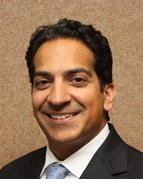Rajiv Chopra is a principal member of the C/N Group in Merrillville, Ind., a family-owned firm that develops, owns and operates ASCs. Mr. Chopra leads the finance and accounting divisions for the C/N Group and its affiliated ASCs.
 Mr. Chopra's professional background centers on banking and management consulting. Before joining the C/N Group, he was a principal consultant in the strategic change practice of PricewaterhouseCoopers Consulting. Mr. Chopra holds a bachelor's degree in finance from Southern Methodist University and an MBA from Northwestern University.
Mr. Chopra's professional background centers on banking and management consulting. Before joining the C/N Group, he was a principal consultant in the strategic change practice of PricewaterhouseCoopers Consulting. Mr. Chopra holds a bachelor's degree in finance from Southern Methodist University and an MBA from Northwestern University.
Speaking to Becker's ASC Review about achieving financial solvency, Mr. Chopra encourages ASCs to be innovative and take risks on up-and-coming specialties. Projecting long term solvency is difficult, he said, because it means not only calculating the past and current state but also considering the future. "When considering long term solvency, a center might want to add new procedures or specialties that are not profitable today but represent the future of where outpatient surgery is going," said Mr. Chopra. "Spine might be one of those areas. If you are conservative, you might wait until reimbursement is up and the cost of supplies comes down. However, if you wait too long the physicians may go to another clinic or hospital and establish a long-term relationship. Long-term solvency also means taking calculated risks."
 Mr. Chopra's professional background centers on banking and management consulting. Before joining the C/N Group, he was a principal consultant in the strategic change practice of PricewaterhouseCoopers Consulting. Mr. Chopra holds a bachelor's degree in finance from Southern Methodist University and an MBA from Northwestern University.
Mr. Chopra's professional background centers on banking and management consulting. Before joining the C/N Group, he was a principal consultant in the strategic change practice of PricewaterhouseCoopers Consulting. Mr. Chopra holds a bachelor's degree in finance from Southern Methodist University and an MBA from Northwestern University.Speaking to Becker's ASC Review about achieving financial solvency, Mr. Chopra encourages ASCs to be innovative and take risks on up-and-coming specialties. Projecting long term solvency is difficult, he said, because it means not only calculating the past and current state but also considering the future. "When considering long term solvency, a center might want to add new procedures or specialties that are not profitable today but represent the future of where outpatient surgery is going," said Mr. Chopra. "Spine might be one of those areas. If you are conservative, you might wait until reimbursement is up and the cost of supplies comes down. However, if you wait too long the physicians may go to another clinic or hospital and establish a long-term relationship. Long-term solvency also means taking calculated risks."

